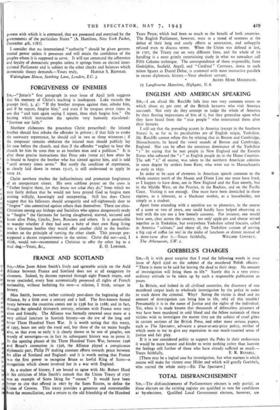FORGIVENESS OF ENEMIES
SIR,—" Janus's" first paragraph in your issue of April 30th suggests that his memory of Christ's teaching is inadequate. Luke records the precept (xvii, 3, 4): " If thy brother trespass against thee, rebuke him, and if he repent, forgive him," and even if he trespass seven times in one day " and turn again saying I repent, thou shalt forgive him." On hearing which instruction the apostles very humanly ejaculated: "Increase our faith."
Matthew elaborates the procedure Christ prescribed: the injured brother should first rebuke the offender in private ; if that fails to evoke the necessary repentance, he should call in two or three witnesses ; if the trespasser remains obdurate the injured man should publicly lay his case before the churoh, and then if the offender " neglect to hear the church let him be unto thee as an heathen man and a publican." It is after these precise instructions that Peter asks (verse 21) how often he is bound to forgive the brother who has sinned against him, and is told " until seventy times seven." But surely the condition of repentance, so clearly laid down in verses 15-17, is still understood to apply in verse 21.
Christ nowhere teaches the indiscriminate and premature forgiveness of an unrepentant sinner. His own sublime prayer on the cross is " Father forgive them, for they know not what they do," from which we may fairly deduce that he would not have prayed God to forgive men sinning wilfully, knowingly and unrepenting. Still less does Christ suggest that his followers should arrogantly and self-righteously dare to "forgive " sins committed against others than themselves. There are ultra- Christians among our bishops and Socialists who appear dangerously ready to " forgive " the Germans for having slaughtered, starved, tortured and burnt alive Poles, Czechs, Jews, Russians and others. It is permissible to wonder whether if they had seen a baby of their own flung living into a German bonfire they would offer another child to the bonfire- tenders on the principle of turning the other check. This precept pre- supposed a decent responsiveness in the smiler. Christ did not—and, I think, would not—recommend a Christian to offer the other leg to a


























 Previous page
Previous page